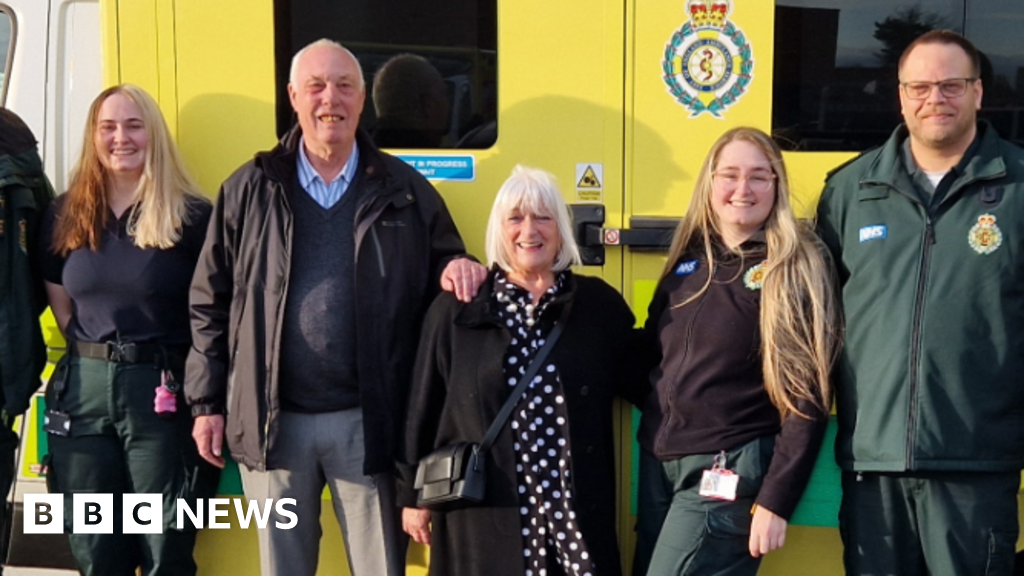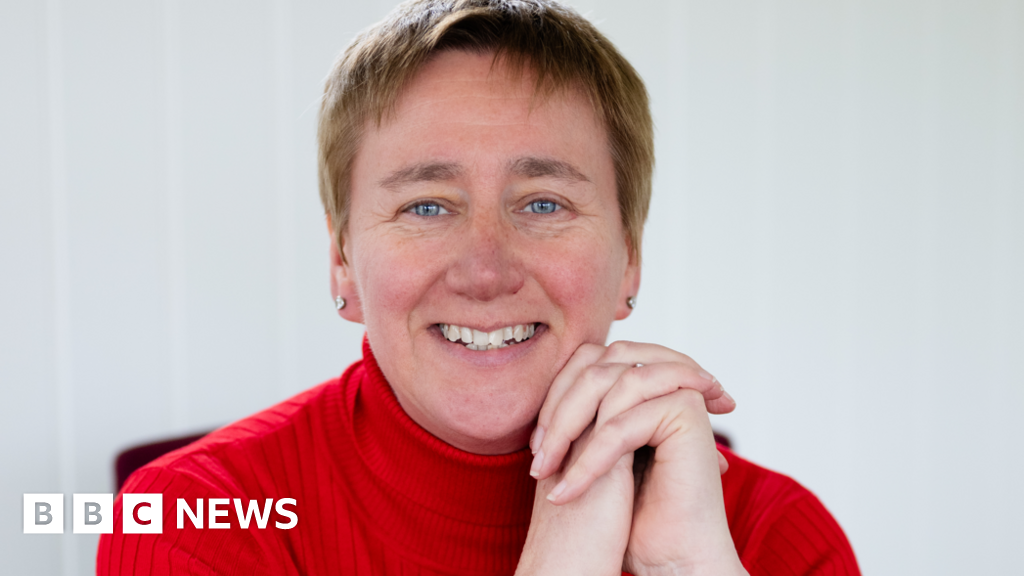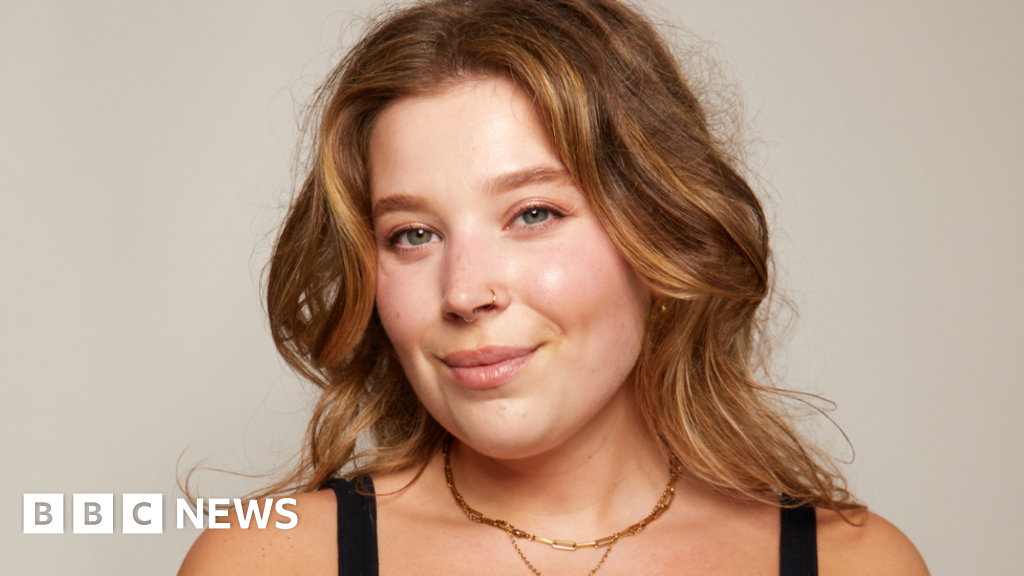9 hours ago
By Nikki Fox & Laura Devlin, BBC News, Bedfordshire

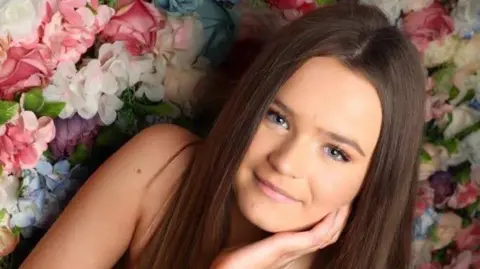 Family handout
Family handout
Amelia Butlin took her own life in her first year at university
The family and friends of a student who took her own life have called on the next government to prioritise mental health support for young people in schools, colleges and universities.
Amelia Butlin, 19, from Leighton Buzzard, Bedfordshire, was a bubbly, outgoing and popular teenager who was in her first year at university, with lots of friends and a family who loved her.
She had ADHD and struggled with anxiety and depression, and after the pandemic had found it difficult to separate herself from social media and her mobile phone. In October, she died by suicide.
"[Politicians] need to wake up to the mental health crisis they're facing," said Amelia's mother, Becci Butlin.

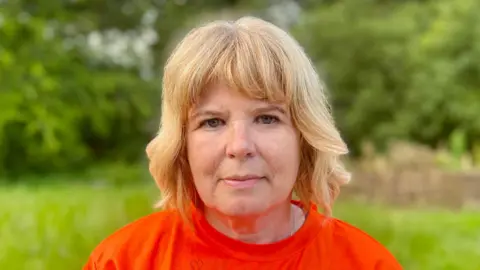 Nikki Fox/BBC
Nikki Fox/BBC
Becci Butlin said people being able to navigate the support available was also an issue
"This generation is the first that is using social media in unbelievable ways and with unbelievable dependency on it," she added.
"They've got all the other stresses of life, they had a difficult teenage period with Covid and there are significantly more mental health issues to come.
"No-one's talking about it. It's a much wider problem than anyone acknowledges."
Naomi Woodford, a mental health support worker at Cedars Upper School, in Leighton Buzzard, which Amelia attended, was among many people who have contacted the BBC via Your Voice, Your Vote to tell us mental health is the most important issue for them during this election.
Ms Woodford works with children and teenagers, some of whom have been affected by the death of Amelia, and believes every school, college and university in the UK should have its own mental health provision.
She described the situation as a "national crisis", and expressed concern that out of 14 schools in the Leighton Buzzard, only two or three have the resources to offer pupils mental health support.
According to the Office for National Statistics, in 2021 more people in England and Wales died by suicide than in 2020.
The data showed 6.9% more deaths by suicide were registered than in 2020.

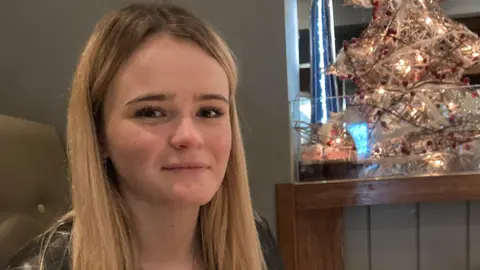 Family handout
Family handout
Amelia Butlin was among many young people impacted by social media
'Huge waiting lists'
Amelia's mother said she was not aware of mental health care being a key priority for any of the main parties, but believed the next government should focus on the approach in schools and by GPs, to ensure those in need of specialist care get a referral as soon as possible.
"The real problem is the complexity of getting the right help," said Ms Butlin.
"Schools aren't equipped for helping children and teenagers and Amelia had left school, so that is even worse.
"If you go through the NHS you are met with huge waiting lists, if you go the private route then there is no-one guiding you."
Ms Butlin recently joined 25 of her daughter's friends on a 15km (nine mile) walk in Amelia's memory and to raise money for the suicide prevention charity Campaign Against Living Miserably
"We've seen the impact suicide has - it has rippled through her friendship group and the community," Ms Butlin added.
"It is important in tragic circumstances to bring people together to do something positive and tangible, and to have that focus that other lives might be saved."
'Ripped us to shreds'

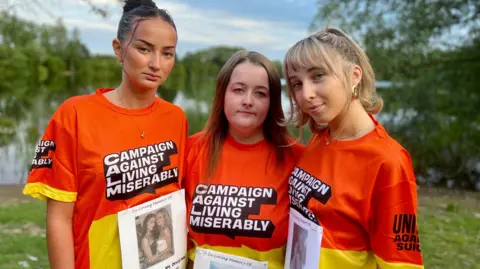 Nikki Fox/BBC
Nikki Fox/BBC
Alicia Down, Charlotte Millar and Emily Ferguson were all friends with Amelia
Alicia Down, 19, a friend of Amelia's, said: "Amelia was the loss of our lives, it's been heartbreaking."
"We've struggled a lot; it has a domino effect.
"When she passed away all of us got the same feelings of depression.
"Losing her has ripped us all to shreds and ruined us, and she is constantly on our minds."
Ms Down expressed concern over social media and its impact on young people's confidence, and said schools and universities were not equipped to offer support when people needed help.
If counselling was offered, she said, it was "six sessions, and then you're off".
'Not defined by a degree'
Charlotte Millar, 20, a university student, said that many young people were not prepared for university life.
While her and Amelia's friendship circle stayed in touch and supported each other through the pandemic, they were then launched into the stress of A-levels and moving to university.
"No matter how independent you think you are, you have no idea what's to come at university," she said.
"You have to make new friends, study and live on your own.
"That's my biggest stress, but you're not defined by a degree and that's not spoken about enough."
She understood that asking for help was not easy, but universities could also be more flexible when students felt "swamped".

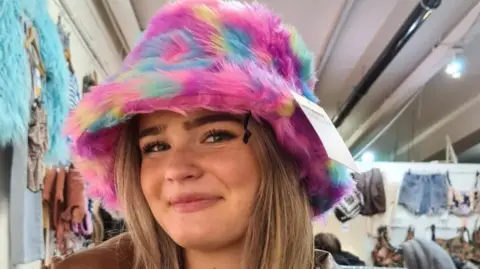 Nikki Fox/BBC
Nikki Fox/BBC
Amelia's friends describe the 19-year-old as a bubbly, outgoing and popular teenager
Emily Ferguson, 20, a friend of Amelia's, said she found it hard to put down her phone and ignore social media.
"There is such a pressure to be a certain way, so it's difficult to feel that you're fine as you are," she said.
"You see people always going out at uni, but you don't have to go on every student night out, every party, you can just go home if you want to.
"A lot of people want to post about what they're doing, but then they don't appreciate the time with whoever they're with.
"You don't have to prove to the world - people don't care that much."

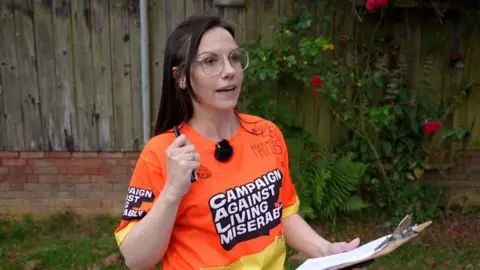 Richard Knights/BBC
Richard Knights/BBC
Naomi Woodford has seen a growing number of young people who are struggling
Ms Woodford said: "The community of Leighton Buzzard and Cedars has been deeply affected over the years with young people taking their lives.
"We have seen a rise in the range and amount of mental health issues since the pandemic, along with exam stress, social anxiety, obsessive-compulsive disorder and eating issues.
"We are in a national crisis, we can't hang on for a one-year, two-year or five-year plan, it needs to happen now.
"We need emergency intervention, we need mental health provision in all our schools, colleges and universities in UK, and I will campaign to make that happen."
What do the parties say?
Labour says it will introduce specialist mental health support for children and young people in every school. It will recruit an additional 8,500 new staff to treat children and adults through our first term. Young Futures hubs will provide open access mental health services for children and young people in every community.
The Conservative Party wants drop-in hubs for 11- to 25-year-olds in every community by 2030, and promises to expand mental health support teams to all schools by 2030. It will also increase the planned expansion of NHS talking therapies for people with anxiety, stress and depression.
The Liberal Democrats say the party will bring in mental health hubs and have a qualified mental health worker in all primary and secondary schools. They will introduce a cabinet minister for young people and extend young people's mental health services up to the age of 25.
The Green Party wants a councillor in every school and sixth form, and says it will ensure people can access mental health therapies in 28 days. It wants to expand community mental health centres, invest £5bn in special educational needs provision and regulate social media.
Reform UK says it will launch an inquiry into social media harm on children and promote app-free smartphones. It says that increasing employment will improve mental health.


 (1).png)
 5 months ago
28
5 months ago
28
